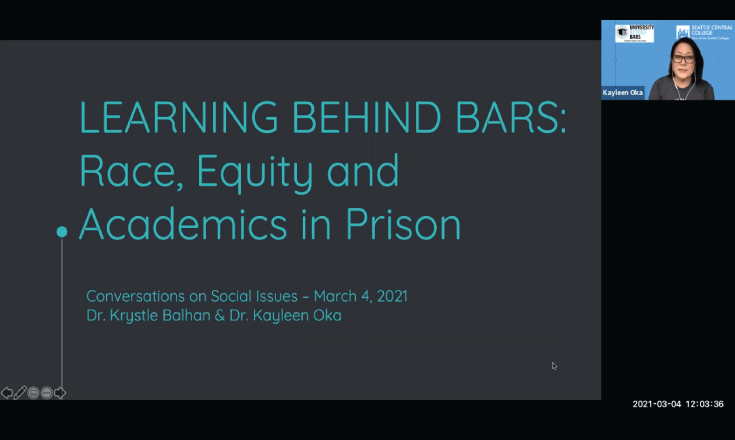Did you know that some Seattle Central students reside in the Monroe Correctional Complex while getting their Associate of Arts degree? On Thursday, March 4, a part of the Conversations on Social Issues (COSI) series was held virtually on Zoom.
This talk was about the potential for higher education to make a difference in prison and the way society sees criminal justice reform. The event was hosted by the library, led by Kimberly Tate-Malone, reference and instruction librarian; with special guests from University Beyond Bars (UBB): Dr. Kayleen Oka, Seattle Central College’s sociology instructor; and Dr. Krystle Balhan, Seattle Central College’s psychology instructor and UBB volunteer.
The talk was held in hope that society would realize the racial inequity that exists within it, and that education is a basic human right which not everyone is able to obtain due to lacking access to the resources needed to succeed. Dr. Oka started the talk with the introduction of UBB. She explained that her family had a lack of education, which encouraged her to give back to those who do not have the resources to be educated.
The talk transitioned to Dr. Balhan introducing the first discussion, “What is the point of prison?” One of the students answered: “To reform the behaviours that led them there and find a way to move on.” Another person spoke out with “The word reform sounds institutional. We should think of prison as opportunities for people to do better.” An interesting comment from the chat box included that prison is also a way to gain ‘money,’ ‘profit’ and for ‘punishment.’ However, Dr. Balhan stated: “That’s not happening in the prison system as we have it.”
The screen showed “The prison system isn’t working”. Dr. Blahan raised a concern that if the purpose of the prison was for rehabilitation or to reform, why do crimes still take place in the system? 3,000 young men of color are being murdered before they are twenty five years old. Without hesitance, it is known that prison is a driver of violence and actually promotes recidivism. Another mentioned topic was that prison was also a tool of racism, with disproportionate damage incurred by communities of color.
Next, Dr. Oka moved on to the discussion of “What is the point of education is prison?” She said that 45% of the people who participate in the prison education program have lower rates of returning to prison; their morale was improved, their post-release job placements were increased, crime rates in their communities were lowered, and their children had higher post-secondary degree attainment.
The last discussion was “How might prison education serve to address larger systems of oppression and racism?”, for which Dr. Oka opened the breakout room for discussion. She mentioned that racial and ethnic groups are overrepresented in the prison system.
The discussion ended with Dr. Oka talking about education as a pathway to equity, that education is a fundamental human right and expressing hope that society will drive down different paths to see justice and the efforts the formerly incarcerated have made to successfully reintegrate into the community.







Be First to Comment